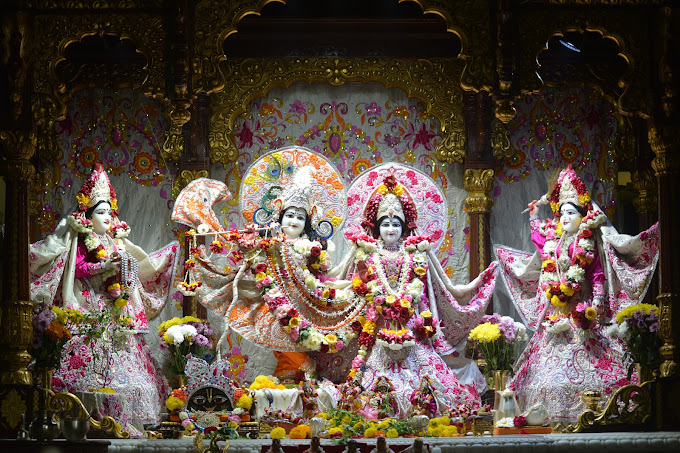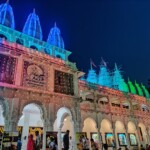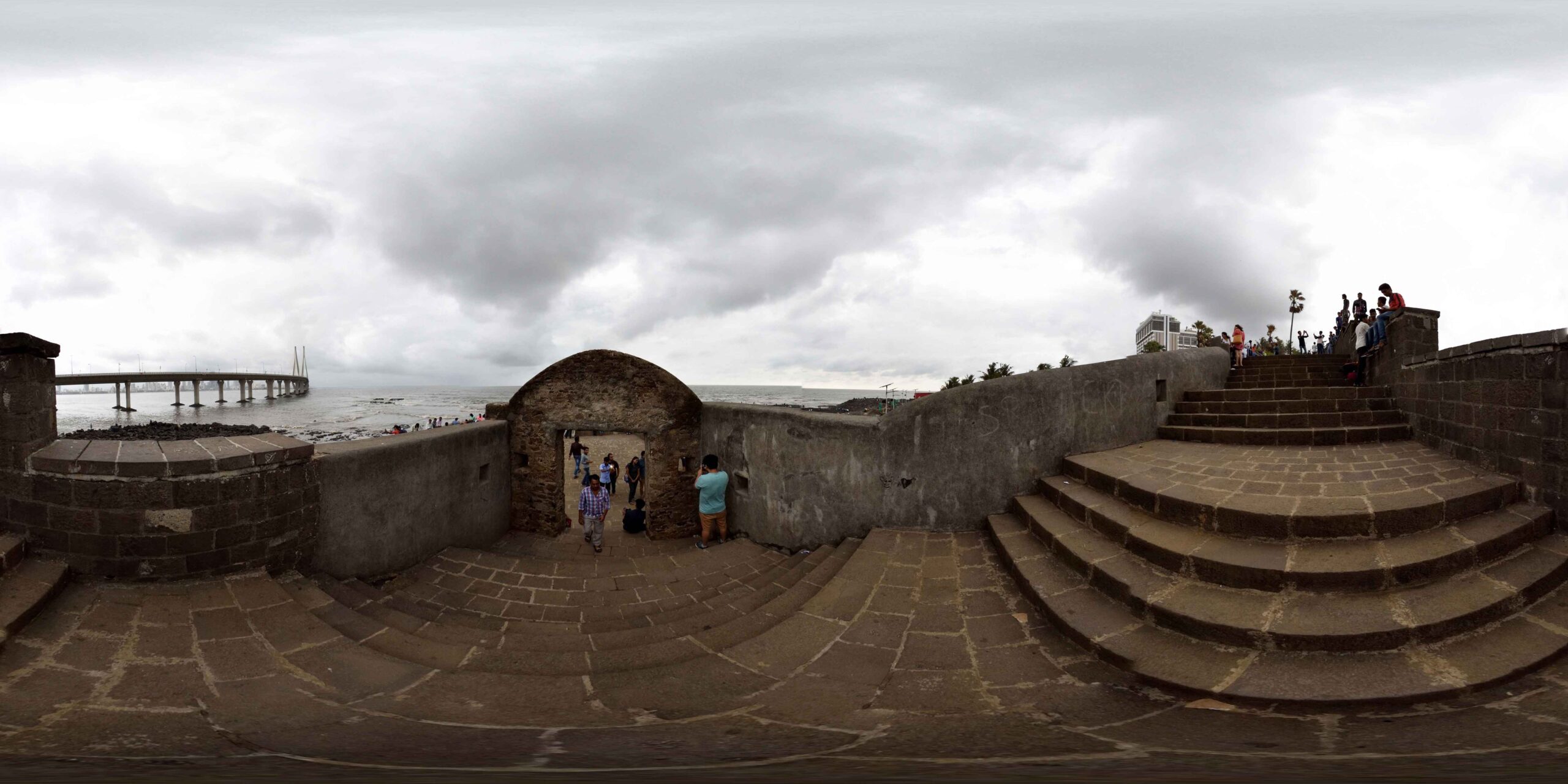
The ISKCON Temple in Mumbai, also known as the Sri Sri Radha Rasabihari Temple, is one of the most prominent spiritual landmarks in the city. Located in the serene vicinity of Juhu, near the famous Juhu Beach, the temple is managed by the International Society for Krishna Consciousness (ISKCON), a global organization dedicated to spreading the teachings of Lord Krishna. The temple’s architecture is a stunning blend of traditional and modern designs, featuring intricate carvings and spacious interiors. The sanctum houses beautifully adorned idols of Radha and Krishna, alongside other deities like Lord Jagannath, Baladeva, Subhadra, and Lord Gauranga. The divine atmosphere is further enriched by the daily rituals of aarti, bhajans, and kirtans, which attract thousands of devotees and visitors.
ISKCON Mumbai is not just a place of worship but also a hub for spiritual and cultural activities. The temple organizes grand celebrations for festivals like Janmashtami, Radhashtami, and Gaura Purnima, drawing large crowds. Regular classes on the Bhagavad Gita, meditation workshops, and youth programs inspire spiritual growth among visitors.
The temple complex also features Govinda’s Restaurant, offering delicious and pure vegetarian meals prepared as per Vedic traditions. A gift shop within the premises sells devotional books, souvenirs, and spiritual merchandise.
ISKCON Mumbai actively engages in community welfare programs, including the Akshaya Patra Midday Meal initiative, which feeds thousands of underprivileged children daily. The temple’s serene environment, coupled with its cultural and charitable initiatives, makes it a haven for spiritual seekers and a must-visit destination in Mumbai.
ISKCON Temple, Juhu, Mumbai Opening and Closing Timing

- The temple is open daily from 4:30 AM to 1:00 PM and from 4:30 PM to 9:00 PM.
- The temple closes in the afternoon from 1:00 PM to 4:30 PM.
ISKCON Temple, Juhu, Mumbai Aarti Timings:
- Mangala Aarti at 4:30 AM – The first worship of the day.
- Tulsi Puja at 5:00 AM – Honoring the sacred Tulsi plant.
- Shringar Darshan at 7:15 AM – Greeting the deities in new attire.
- Guru Puja at 7:25 AM – Honoring the Founder-Acharya.
- Bhagavatam Class at 8:00 AM – Discourse from Vedic scriptures.
- Raj Bhoga Aarti at 12:30 PM – Post-noon worship.
- Usthapana Aarti at 4:15 PM – Early evening worship.
- Sandhya Aarti at 7:00 PM – Evening worship ceremony.
- Bhagavad-Gita Discourse at 7:30 PM – Spiritual discourse.
- Shayana Aarti at 8:30 PM – The last worship ceremony of the day.
Darshan is available during the open hours, with specific rituals like Mangala Aarti, Sandhya Aarti, and others performed at designated times.
Significance of ISKCON Temple, Juhu, Mumbai
The ISKCON Temple holds profound significance as a spiritual, cultural, and philanthropic center, rooted in the teachings of Gaudiya Vaishnavism, which emphasizes devotion to Lord Krishna. Here are key aspects of its importance:
1. Spiritual Center:
ISKCON temples are dedicated to promoting bhakti yoga (the path of devotion) to Lord Krishna. They provide a sacred space for individuals to connect with divinity through rituals, prayers, and meditation. The temple serves as a beacon for spiritual seekers, offering guidance through regular discourses on texts like the Bhagavad Gita and Srimad Bhagavatam.
2. Cultural Preservation:
ISKCON temples are vibrant hubs for celebrating Indian traditions and festivals such as Janmashtami, Radhashtami, and Gaura Purnima. These events showcase devotional music, dance, and drama, keeping cultural heritage alive. They promote Sanskrit learning and Vedic literature, preserving ancient wisdom.
3. Community and Charity:
ISKCON is renowned for its Akshaya Patra Program, which provides nutritious meals to millions of underprivileged children in India. The temple fosters a sense of community through seva (service), offering volunteers opportunities to engage in humanitarian efforts.
4. Global Outreach:
Founded by Srila Prabhupada in 1966, ISKCON has become a worldwide movement, spreading the message of Krishna consciousness across cultures. It transcends barriers of nationality and religion, uniting devotees in love for Lord Krishna.
5. Inner Transformation:
Through practices like mantra meditation (chanting the Hare Krishna Mahamantra), visitors experience inner peace, clarity, and a sense of purpose. ISKCON inspires ethical living, vegetarianism, and environmental consciousness, aligning spiritual and material lives.
Image Gallery Of ISKCON Temple, Juhu, Mumbai
Architecture of ISKCON Temple, Juhu, Mumbai
The ISKCON Temple in Mumbai, also known as Sri Sri Radha Rasabihari Temple, is an architectural marvel that blends traditional Indian temple design with modern aesthetics. Its structure reflects the devotion and craftsmanship that went into creating a serene and sacred environment for worship and meditation. Here’s a detailed look at its architecture:
1. Grand Entrance and Façade:
The temple’s entrance is majestic, symbolizing a gateway to spiritual transcendence. Intricate carvings and motifs adorn the exterior, showcasing elements of Vedic architecture, with influences from classical North Indian temple styles.
2. Temple Structure:
The main temple is constructed with white marble, lending it a pristine and divine appearance. The shikhara (spire) rises prominently, a hallmark of traditional Hindu temples, symbolizing the connection between earth and the heavens. Spacious courtyards and open spaces around the temple enhance its grandeur and provide a tranquil atmosphere.
3. Sanctum Sanctorum:
The sanctum houses exquisitely adorned idols of Sri Sri Radha Rasabihari, along with other deities such as Lord Jagannath, Baladeva, Subhadra, and Sri Chaitanya Mahaprabhu. The altar is intricately designed with gold and woodwork, creating an ethereal ambiance.
4. Interiors:
The interiors feature vibrant, hand-painted murals and artwork depicting scenes from the Mahabharata, Ramayana, and the life of Lord Krishna. Chandeliers and soft lighting add to the divine and serene atmosphere.
5. Auxiliary Facilities:
The temple complex includes a prasadam hall, Govinda’s restaurant, and a bookstore, all seamlessly integrated into the design. A guest house with well-maintained rooms accommodates pilgrims.
6. Landscaping:
The temple is surrounded by lush greenery and manicured gardens, enhancing its peaceful setting.
History of ISKCON temple in Mumbai
The ISKCON Temple in Mumbai, also known as the Sri Sri Radha Rasabihari Temple, holds a rich history closely tied to the founding and expansion of the International Society for Krishna Consciousness (ISKCON).
1. Foundation and Vision:
The temple was envisioned by His Divine Grace A.C. Bhaktivedanta Swami Prabhupada, the founder of ISKCON, who sought to establish centers worldwide to spread Krishna consciousness. The Mumbai temple was among the first major ISKCON projects in India, signifying the movement’s return to its cultural and spiritual roots after its rapid global expansion.
2. Establishment:
The land for the temple in Juhu, Mumbai, was acquired in the early 1970s, after considerable efforts by Srila Prabhupada and his disciples. At the time, the area was largely undeveloped. Srila Prabhupada personally supervised the project and overcame significant challenges, including legal disputes over the property, financial constraints, and resistance from local authorities and landowners.
3. Construction:
Construction began in earnest in the mid-1970s, with Srila Prabhupada’s guidance emphasizing the creation of a sacred and inviting space for spiritual seekers. The temple was built using white marble, with intricate designs that reflect a blend of traditional Indian temple architecture and modern styles.
4. Inauguration:
The temple was formally inaugurated in 1978, a year after Srila Prabhupada’s passing. It was dedicated to Sri Sri Radha Rasabihari, the presiding deities of the temple. The idols of Radha and Krishna, originally housed in a temporary structure, were installed in the new temple with elaborate rituals.
5. Growth and Impact:
Over the decades, the temple has become a spiritual and cultural hub, attracting millions of devotees annually. It has played a pivotal role in popularizing bhakti yoga, kirtans, and the Hare Krishna Movement in India.
Places to Explore near ISKCON Temple in Mumbai
The ISKCON Temple in Juhu, Mumbai, is located in a vibrant area with plenty of attractions nearby.
1. Juhu Beach:
Juhu Beach, located just 500 meters from the ISKCON Temple, is one of Mumbai’s most popular destinations. Visitors can enjoy peaceful walks, stunning sunsets, and indulge in iconic street foods like pav bhaji, bhel puri, and vada pav, making it a perfect spot for relaxation.
2. Prithvi Threatre:
Prithvi Theatre, located just 1 km from ISKCON Temple, is a renowned venue for performing arts in Mumbai. It hosts live plays, cultural performances, and art exhibitions, making it a must-visit for theater lovers. After the show, relax at the cozy Prithvi Café, offering snacks and coffee in a charming setting.
3. Juhu Chowpatty Food Stalls:
Located about 1 km from the ISKCON Temple, Juhu Chowpatty Food Stalls are a haven for food lovers. The area comes alive in the evening, offering Mumbai’s iconic street foods like pav bhaji, bhel puri, and vada pav. It’s a vibrant spot to enjoy delicious treats while soaking in the lively atmosphere.
4. Versova Beach:
Versova Beach, located about 4 km from ISKCON Temple, offers a quieter and more serene alternative to Juhu Beach. It’s ideal for relaxation, enjoying the sea breeze, and appreciating the scenic views. The beach is also known for its community-driven clean-up drives.
5. Gilbert Hill:
Gilbert Hill, located about 3.5 km from ISKCON Temple, is a 66-million-year-old monolithic rock formation and a rare geological wonder in Mumbai. Visitors can climb to the top to enjoy stunning panoramic views of the city and its surroundings.
6. NMIMS University Area (Vile Parle):
The NMIMS University area in Vile Parle, about 2.5 km from ISKCON Temple, is a lively hub with vibrant streets filled with cafes, eateries, and trendy shopping spots, making it a favorite hangout for students and visitors alike.
7. Lokhandwala Market:
Lokhandwala Market, located about 5 km from ISKCON Temple, is a bustling shopping hub featuring boutiques, street shops, and cafes. It’s a paradise for shopping enthusiasts seeking trendy fashion, accessories, and unique local items at great bargains.
8. The Club (Andheri West):
The Club, located about 3 km from ISKCON Temple in Andheri West, is a luxurious sports and recreation center. It offers swimming pools, tennis courts, and fine dining, making it a perfect place to relax and unwind after a temple visit.
9. Infinity Mall (Andheri West):
Infinity Mall, located about 4 km from ISKCON Temple in Andheri West, is a popular shopping and entertainment hub. It features a variety of stores, a vibrant food court, and a multiplex for enjoying the latest movies.
10. Hare Krishna Land – Govinda’s Restaurant:
Located within the ISKCON complex, Govinda’s Restaurant is a must-visit for its delicious satvik vegetarian food. Offering a buffet-style dining experience, it serves a variety of wholesome dishes, providing visitors with a satisfying and divine culinary experience.
How to reach ISKCON Temple Mumbai
The ISKCON Temple in Mumbai (Sri Sri Radha Rasabihari Temple) is located in Juhu, a prominent suburb of Mumbai. Here is how you can reach the temple via different modes of transportation:
1. By Air:
The nearest airport is Chhatrapati Shivaji Maharaj International Airport (CSIA), located about 6–8 kilometers away.
From the airport, you can take a taxi, auto-rickshaw, or app-based cab (like Ola or Uber) to reach the temple in approximately 20–30 minutes, depending on traffic.
2. By Train:
Nearest Railway Station:
- Andheri Station (on the Western Line): The station is around 4 kilometers from the temple.
- Vile Parle Station is another nearby station (approximately 5 kilometers away).
- From either station, you can take a taxi, auto-rickshaw, or bus to the temple. It takes around 15–20 minutes to reach Juhu.
3. By Bus:
The BEST (Brihanmumbai Electric Supply and Transport) runs buses connecting Juhu to various parts of Mumbai.
- Buses like 231, 259, and others stop near Juhu Beach, which is close to ISKCON Temple.
- The temple is about 10 minutes’ walk from Juhu Beach.
4. By Road:
The temple is easily accessible via major roads like JVPD Scheme and Juhu Tara Road. You can drive your own vehicle, hire a taxi, or use app-based cab services (like Uber or Ola). Parking facilities are available near the temple.
5. By Metro:
Nearest Metro Station: DN Nagar Metro Station on Mumbai Metro Line 1 (Versova-Ghatkopar). From DN Nagar, the temple is about 3 kilometres away. You can hire an auto-rickshaw or taxi to reach ISKCON.
6. Landmark:
The ISKCON Temple is located near Juhu Beach and Prithvi Theatre, two popular landmarks in Mumbai. Asking locals for directions to “ISKCON Juhu” will easily guide you.
Google Map of ISKCON Temple, Juhu, Mumbai
FAQs about the ISKCON Temple, Juhu, Mumbai
Where is ISKCON Temple located in Juhu?
ISKCON Juhu Temple is located at Hare Krishna Land, near Juhu Beach, Mumbai 400049. The temple is easily accessible from various parts of Mumbai.
What are the visiting hours of ISKCON Juhu Temple?
The temple is open to devotees and visitors at the following timings:
- Morning: 4:30 AM to 1:00 PM
- Evening: 4:30 PM to 9:00 PM
Timings may vary on special occasions and festivals.
What activities can I experience at ISKCON Juhu Temple?
Visitors can participate in several activities, including:
- Daily Aarti (prayer) ceremonies
- Listening to spiritual discourses and chanting sessions
- Enjoying the temple’s prasadam (sanctified food)
- Visiting the Govinda’s restaurant, a popular vegetarian eatery
- Exploring the temple's gift shop and spiritual literature
Is there any dress code for visiting ISKCON Juhu Temple?
While there is no strict dress code, visitors are encouraged to wear modest and respectful attire appropriate for a place of worship. Traditional Indian wear is preferred.
Are there any accommodations available near the temple?
Yes, ISKCON Juhu Temple offers its own guesthouse accommodations for devotees and visitors. These facilities are well-maintained and suitable for short stays. Additionally, Juhu has several nearby hotels.
What are the major festivals celebrated at ISKCON Juhu Temple?
Some of the major festivals celebrated with grandeur include:
- Janmashtami (the birth of Lord Krishna)
- Rath Yatra (Chariot Festival)
- Gaura Purnima (appearance of Lord Chaitanya Mahaprabhu)
- Diwali and Govardhan Puja
- Holi (Festival of Colors)
Is photography allowed inside the temple?
Photography is generally not allowed inside the main sanctum of the temple. However, visitors may take photos in designated areas outside the sanctum with permission.
How can I reach ISKCON Temple Juhu?
- By Train: The nearest railway station is Andheri (West). From there, auto-rickshaws or taxis can be taken.
- By Metro: Nearest metro station is DN Nagar.
- By Bus/Taxi: Regular buses and taxis operate to Juhu Beach, which is close to the temple.
Is there any entry fee for ISKCON Juhu Temple?
No, entry to the ISKCON Juhu Temple is completely free. Visitors are welcome to explore the temple and participate in its activities.
What is the significance of Govinda's Restaurant at ISKCON Juhu?
Govinda's Restaurant offers pure vegetarian and sattvic meals prepared without onion, garlic, or non-vegetarian ingredients. It is well-known for its delicious and healthy dishes, attracting both devotees and food lovers.
Can I attend spiritual lectures or programs at ISKCON Juhu?
Yes, the temple hosts daily spiritual lectures, kirtans, and Bhagavad Gita classes. Visitors are welcome to join these programs and learn about Krishna Consciousness and Vedic teachings.
Does ISKCON Juhu have facilities for children and families?
Yes, ISKCON Juhu Temple is family-friendly and often hosts programs for children, such as cultural activities, storytelling, and spiritual workshops.
Can I donate to ISKCON Juhu Temple?
Yes, donations are welcome. Visitors can contribute in person at the temple or online through the official ISKCON Juhu website to support its spiritual, cultural, and charitable initiatives.
Are there guided tours available for visitors?
Guided tours can be arranged upon request, where visitors are taken through the temple premises, its history, and the significance of Krishna Consciousness.






